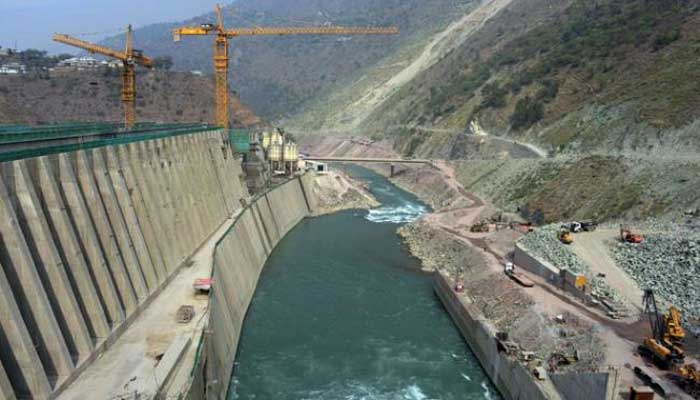Chinese contractor of Neelam-Jhelum project recalls disasters that pushed project to brink
The recently inaugurated Neelam-Jhelum Hydropower project has experienced four major natural disasters during its construction in the past ten years, Feng Xinglong, Chairman of China’s Gezhouba Group sa
BEIJING: The recently inaugurated Neelam-Jhelum Hydropower project has experienced four major natural disasters during its construction in the past ten years, Feng Xinglong, Chairman of China’s Gezhouba Group said.
Feng, in an interview with Chinese website ‘Sina.com’ published on Wednesday, said each disaster had pushed the project to the brink of failure.
He said in 2010, a major flood in 100 years occurred in Pakistan, and facilities were destroyed in the entire tender area; in 2014, floods were re-emerged, and the stilling pools under construction were submerged; in 2014, water was poured through tunnels in river sections; and in 2015, a tunnel boring machine encountered a strong rock burst, resulting in buried equipment and extensive damage to parts.
Faced with the catastrophic situation, Chinese builders relied on their excellent skills and tenacious spirit, he added.
Feng said every time they successfully rescued the project from the brink of failure, especially after the extremely strong rock burst, Chinese technicians rapidly responded to the damaged equipment. The ground repairs were carried out and repair work was completed and excavation resumed in only seven months without affecting the quality of the project.
Had other foreign manufacturers been asked to replace all the damaged parts, only the parts procurement and shipping time cycle would be up to one year, and the cost would be high, he added.
Feng said it was the China Gezhouba Group, which was responsible for the construction of the Pakistan’s national hydropower project.
He said since the project was launched in January 2008, it had overcome one difficulty after another with decade-long technology, excellent skills, and unremitting persistence. Ultimately leading the “Three Gorges Project in Pakistan” ushered in today’s new glory, he added.
Feng said at the beginning of the project, Chinese employees interpreted the project’s initials NJ as “No Joke”. “It is the pride of China’s builders, who have succeeded in the project, and have not allowed it to fail, as well as serious and serious rigor,” he added.
He said in order to ensure the smooth progress of the project construction and benefit from the completion of the project, the company strived to achieve excellence in the selection of all equipment.
On the construction equipment, where the project site was located, where the “world’s top construction equipment exposition” was opened; on the permanent equipment, as the core of the hydropower station, the generator set selected the domestic top-level products, providing continuous and stable power generation after the completion of the power station.
With Prime Minister Shahid Khaqan Abbasi personally pressing the unit start button in the control room, the first 243,000 kilowatts unit of the Neelum-Jhelum hydropower plant was officially put into commercial operation.
In his speech, the prime minister acknowledged the hard work of the Chinese builders that made the “impossible task” a success and became another important result of the cooperation between the two countries.
Although, the total installed capacity of 969,000 kilowatts, the Neelum-Jhelum hydropower station was of special significance to other power plants in Pakistan.
According to the news portal, geographically, the power plant was located on the upper stream of the Indus River, the Jhelum River. It was Pakistan’s first large-scale hydropower station built on the upper reaches of the Indus River.
The news portal said,“It is a unique case of the unique design of the long water diversion tunnel and underground powerhouse built and constructed in Pakistan. It has a small impact on the natural environment.
“The river has a low requirement for drop height, but with it, the difficulty of construction increases. The total length of the underground project is 68 kilometres, the maximum depth is close to two kilometres, and it passes through the large fault zone in the Himalayas.
It is these special features that allow Pakistanis to always have special feelings for the Neelum-Jhelum hydropower station, calling it “Pakistan’s Three Gorges Project.”
On the wall of the conference room of the Neelum-Jhelum Hydropower Project, there are several characters: “Open and inclusive, clear, honest, and enterprising.”
According to Feng, this was what the project builders had concluded in the past ten years. The spirit of the Neelum-Jhelum was based on this spirit. The builders had overcome challenges and difficulties one by one and stepped the project to success.
With the Gezhouba Group further deepening its efforts in the Pakistan hydropower sector, especially the construction of the Sukikinari and Dasu hydropower stations had been launched one after another.
This spirit from the “Three Gorges Project in Pakistan” would also be carried forward at more project sites to help the Pakistani government and the people had built more great hydropower projects that benefit the country and the people
-
Security forces gun down 30 terrorists in multiple IBOs in KP: ISPR
-
MQM-P calls for new province in Sindh
-
US report validates Pakistan military edge over India: PM
-
Banned TTP poses serious threat to Pakistan security: UNSC panel
-
CM Afridi clarifies remarks on by-poll after ECP requests army deployment
-
Dubai sees 3.2m Pakistani passengers in 2025 as airport sets new milestone
-
Security forces kill 23 Indian proxy terrorists in KP's Kurram
-
Pakistan to construct island to boost oil exploration: report












